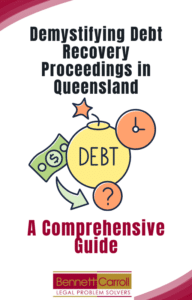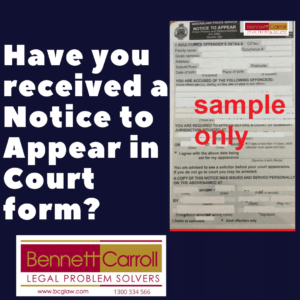When someone brings an action against you in court, you may find out when the initiating documents are served on you. If they are looking for damages, the documents can be an Application, or more usually a Claim (and a Statement of Claim). These are documents that have been written in the specific form required by the court and they set out what the party suing you (the plaintiff) says you owe them (the Claim) and the reasons why (the Statement of Claim).
What happens next? Your Options?
1. Do nothing
If you do not respond to the originating process with the court, after 28 days from the date of filing, the Plaintiff will file for a Default Judgment on the basis that you are either unwilling or unable to contest the proceedings in a trial on the merits. In those circumstances, the rules of court assume that a fair result can be achieved at a substantially reduced cost without a full trial. The court would order the payment of the liquidated amount of damages in the Claim and very likely all of the accrued interest to that date and likely all or most of the legal fees they have claimed.
This option does not incur any legal fees, but would almost certainly result in all of the above mentioned damages being ordered against you.
We strongly recommend against doing nothing.
2. File a Notice of Intention to Defend and Defence
The rules of the court require the Notice of Intention to Defend and Defence be filed and served on the Plaintiff within 28 days, as mentioned above. These documents in response advise the court that you are willing and able to contest the allegations in the Statement of Claim. They must provide enough merit in your own particulars that the court would have to hear the evidence and use judicial reasoning to determine the outcome, or the Plaintiff may apply to the court for a Summary Judgment. Presuming there is no Summary Judgment, that the Plaintiff does not discontinue the proceeding, and there is no negotiated settlement reached between the parties, the matter will go to a trial before a Magistrate and an order of the court will be made determining the outcome.
This option allows you to put your side to the court to try to persuade the Magistrate that there is a lawful reason you have not paid the amount of the Claim. There will be legal fees associated with the preparation of the defence materials mentioned above, and for the preparation of the evidence and witnesses, and of course for representation at the trial.
This option is recommended as the minimum response that you should consider to protect your rights and attempt to avoid having to pay the damages claimed.
3. File a Notice of Intention to Defend a Defence and a Counterclaim
In addition to the defence materials describe in option 2 above, the Counterclaim is a document that sets out the facts that you say establishes an action against the Plaintiff and is essentially an action in its own right – this facilitates the joint trial of two claims. Like the Claim made against you, the Plaintiff must file an Answer with the court because if they do not, you can get a Default Judgment against them for the Counterclaim.
If the facts of your matter support a Counterclaim, this option is strongly recommended as making out the case against the other party is likely the basis of the defence. It is essentially the same argument made under option 2 and if done with a Counterclaim as well, it could lead to not just preventing you from having to pay damages, but potentially having damages paid to you.
The cost in preparation of the materials and dealing with the Answer will increase the time and cost of the matter and you must consider how that fits with your desired outcome.
Further considerations
You should be aware that contesting the matter in a trial at court is only one outcome of choosing option 2 or 3. There will be several steps prior to the trial, which would likely be at least six months in the future, at the soonest.
Most civil matters settle before the trial, either by negotiations with offers back and forth between the parties, or at the required settlement conference that must take place before its heard in court.
Properly prepared documents are essential to your success in defending civil matters. We can guide you through the process and ensure that your matter has the best possible chance of succeeding. Whether negotiating a settlement or pleading your case in court, we have the experience you can count on.
Call us on 1300 334 566 or email info@bcglaw.com.au and safeguard your interests every step of the way.








